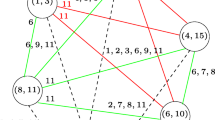Abstract
Clustering algorithms based on a matrix of pairwise similarities (kernel matrix) for the data are widely known and used, a particularly popular class being spectral clustering algorithms. In contrast, algorithms working with the pairwise distance matrix have been studied rarely for clustering. This is surprising, as in many applications, distances are directly given, and computing similarities involves another step that is error-prone, since the kernel has to be chosen appropriately, albeit computationally cheap. This paper proposes a clustering algorithm based on the SDP relaxation of the max-k-cut of the graph of pairwise distances, based on the work of Frieze and Jerrum. We compare the algorithm with Yu and Shi’s algorithm based on spectral relaxation of a norm-k-cut. Moreover, we propose a simple heuristic for dealing with missing data, i.e., the case where some of the pairwise distances or similarities are not known. We evaluate the algorithms on the task of clustering natural language terms with the Google distance, a semantic distance recently introduced by Cilibrasi and Vitányi, using relative frequency counts from WWW queries and based on the theory of Kolmogorov complexity.
This work was supported by JSPS 21st century COE program C01. Additional support has been provided by the MEXT Grand-in-Aid for Scientific Research on Priority Areas under Grant No. 18049001.
Preview
Unable to display preview. Download preview PDF.
Similar content being viewed by others
References
Borchers, B., Young, J.G.: Implementation of a primal-dual method for sdp on a shared memory parallel architecture (March 27, 2006)
Cilibrasi, R., Vitányi, P.M.B.: Automatic meaning discovery using Google. CWI, Amsterdam (Manuscript, 2006)
Ding, C.H.Q., He, X., Zha, H., Gu, M., Simon, H.D.: A min-max cut algorithm for graph partitioning and data clustering. In: ICDM 2001: Proceedings of the 2001 IEEE International Conference on Data Mining, pp. 107–114. IEEE Computer Society, Los Alamitos (2001)
Frieze, A., Jerrum, M.: Improved algorithms for max k-cut and max bisection. Algorithmica 18, 67–81 (1997)
Goemans, M.X., Williamson, D.P.: 879-approximation algorithms for MAX CUT and MAX 2SAT. In: STOC 1994: Proceedings of the twenty-sixth annual ACM symposium on Theory of computing, pp. 422–431. ACM Press, New York (1994)
Graepel, T.: Kernel matrix completion by semidefinite programming. In: Dorronsoro, J.R. (ed.) ICANN 2002. LNCS, vol. 2415, pp. 694–699. Springer, Heidelberg (2002)
Lanckriet, G.R.G., Cristianini, N., Bartlett, P., Ghaoui, L.E., Jordan, M.I.: Learning the kernel matrix with semidefinite programming. JMLR 5, 27–72 (2004)
Li, M., Chen, X., Li, X., Ma, B., Vitányi, P.M.B.: The similarity metric. IEEE Transactions on Information Theory 50(12), 3250–3264 (2004)
Schölkopf, B., Smola, A., Müller, K.-R.: Nonlinear component analysis as a kernel eigenvalue problem. Neural Computation 10(5), 1299–1319 (1998)
Sturm, J.: Using SeDuMi 1.02, a MATLAB toolbox for optimization over symmetric cones. Optimization Methods and Software 11(12), 625–653 (1999)
Xing, E.P., Jordan, M.I.: On semidefinite relaxation for normalized k-cut and connections to spectral clustering. Technical Report UCB/CSD-03-1265, EECS Department, University of California, Berkeley (2003)
Yu, S.X., Shi, J.: Multiclass spectral clustering. In: ICCV 2003: Proceedings of the Ninth IEEE International Conference on Computer Vision, pp. 313–319. IEEE Computer Society, Los Alamitos (2003)
Author information
Authors and Affiliations
Editor information
Editors and Affiliations
Rights and permissions
Copyright information
© 2006 Springer-Verlag Berlin Heidelberg
About this paper
Cite this paper
Poland, J., Zeugmann, T. (2006). Clustering Pairwise Distances with Missing Data: Maximum Cuts Versus Normalized Cuts. In: Todorovski, L., Lavrač, N., Jantke, K.P. (eds) Discovery Science. DS 2006. Lecture Notes in Computer Science(), vol 4265. Springer, Berlin, Heidelberg. https://doi.org/10.1007/11893318_21
Download citation
DOI: https://doi.org/10.1007/11893318_21
Publisher Name: Springer, Berlin, Heidelberg
Print ISBN: 978-3-540-46491-4
Online ISBN: 978-3-540-46493-8
eBook Packages: Computer ScienceComputer Science (R0)




